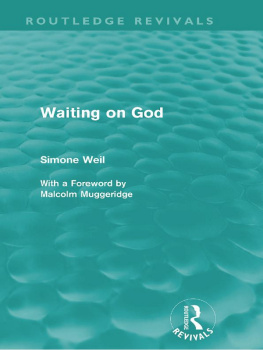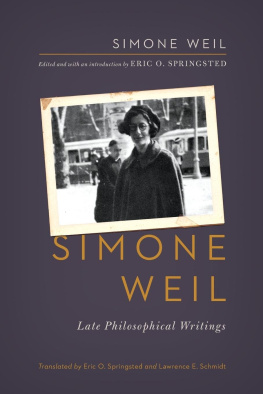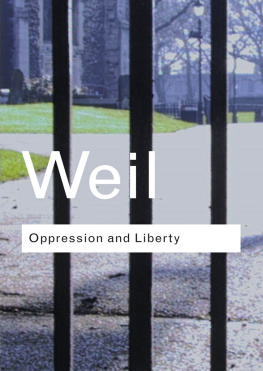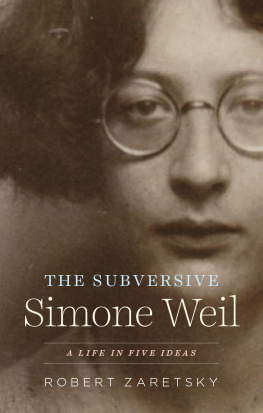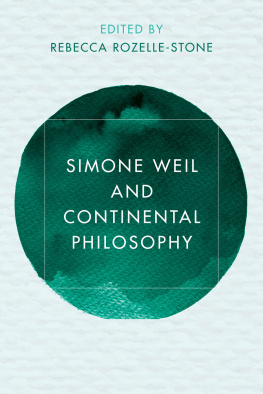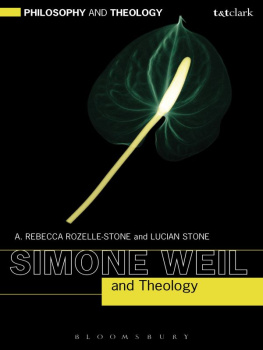Simone Weil - Waiting on God
Here you can read online Simone Weil - Waiting on God full text of the book (entire story) in english for free. Download pdf and epub, get meaning, cover and reviews about this ebook. year: 2011, publisher: Routledge, genre: Science. Description of the work, (preface) as well as reviews are available. Best literature library LitArk.com created for fans of good reading and offers a wide selection of genres:
Romance novel
Science fiction
Adventure
Detective
Science
History
Home and family
Prose
Art
Politics
Computer
Non-fiction
Religion
Business
Children
Humor
Choose a favorite category and find really read worthwhile books. Enjoy immersion in the world of imagination, feel the emotions of the characters or learn something new for yourself, make an fascinating discovery.
- Book:Waiting on God
- Author:
- Publisher:Routledge
- Genre:
- Year:2011
- Rating:3 / 5
- Favourites:Add to favourites
- Your mark:
- 60
- 1
- 2
- 3
- 4
- 5
Waiting on God: summary, description and annotation
We offer to read an annotation, description, summary or preface (depends on what the author of the book "Waiting on God" wrote himself). If you haven't found the necessary information about the book — write in the comments, we will try to find it.
Waiting on God — read online for free the complete book (whole text) full work
Below is the text of the book, divided by pages. System saving the place of the last page read, allows you to conveniently read the book "Waiting on God" online for free, without having to search again every time where you left off. Put a bookmark, and you can go to the page where you finished reading at any time.
Font size:
Interval:
Bookmark:

A work first published in English in 1951, Waiting on God forms the best possible introduction to the work of Simone Weil, for it brings us into direct contact with this amazing personality, at once so pure, so ardent, so utterly sincere, yet normally so reserved that only her closest friends guessed the secrets of her inner life.
The first part of the book concerns her letters written to the Reverend Father Perrin, O.P., who befriended her at Marseilles and, the only priest she knew, became her intimate friend. The second part of the book concerns essays and reflections on such subjects as education, human affliction and the love of God, prayer, and forms of the implicit love of God.
First published in Great Britain in 1951
by Routledge & Kegan Paul Ltd
This edition first published in 2010 by Routledge
2 Park Square, Milton Park, Abingdon, Oxon, OX14 4RN
Simultaneously published in the USA and Canada
by Routledge
270 Madison Avenue, New York, NY 10016
Routledge is an imprint of the Taylor & Francis Group, an informa business Translated from the French by Emma Craufurd
This edition published in the Taylor & Francis e-Library, 2009.
To purchase your own copy of this or any of Taylor & Francis or Routledges collection of thousands of eBooks please go to www.eBookstore.tandf.co.uk.
Translation 1951, 1979 Routledge & Kegan Paul
Foreword 1979 Malcolm Muggeridge
All rights reserved. No part of this book may be reprinted or reproduced or utilised in any form or by any electronic, mechanical, or other means, now known or hereafter invented, including photocopying and recording, or in any information storage or retrieval system, without permission in writing from the publishers.
Publishers Note
The publisher has gone to great lengths to ensure the quality of this reprint but points out that some imperfections in the original copies may be apparent.
Disclaimer
The publisher has made every effort to trace copyright holders and welcomes correspondence from those they have been unable to contact.
ISBN 0-203-09247-3 Master e-book ISBN
ISBN 13:978-0-415-56238-6 (hbk)
ISBN 13:978-0-203-09247-7 (ebk)
eISBN :978-0-2030924-7-7
ISBN 10:0-415-56238-4 (hbk)
ISBN 10:0-203-09247-3 (ebk)
First published in Great Britain in 1951
by Routledge & Kegan Paul Ltd
This edition first published in 1979 by Routledge & Kegan Paul
39 Store Street, London WC1E 7DD and
Broadway House, Newtown Road,
Henley-on-Thames, Oxon RG9 1EN
First published in France in 1950 as
Attente de Dieu
Translated from the French by Emma Craufurd
This edition published in the Taylor & Francis e-Library, 2009.
To purchase your own copy of this or any of
Taylor & Francis or Routledges collection of thousands of eBooks
please go to www.eBookstore.tandf.co.uk.
TranslationRoutledge & Kegan Paul, 1951, 1979
ForewordMalcolm Muggeridge 1979
No part of this book may be reproduced in
any form without permission from the
publisher, except for the quotation of brief
passages in criticism
British Library Cataloguing in Publication Data
Weil, Simone
Waiting on God.2nd ed
1. ChristianityPhilosophy
I. Title201 BR100
ISBN 0-203-09247-3 Master e-book ISBN
ISBN 0 7100 0248 3
Interest in the life and writings of Simone Weil has gone on steadily increasing since her death in 1943 at the age of thirty-four. At the time of her death her only published work consisted of a few articles in obscure periodicals and, apart from some leftist trade unionists and Gaullists she worked with at their war-time headquarters in London, she was unknown outside the circle of her friends and family. From one of her letters to Fr Perrin, the Dominican priest who became her friend and counsellor in 1942 when she was waiting in Marseilles for a boat to take her and her parents to America, it is apparent that this obscurity troubled her; she writes to him that if no one consents to take any notice of the thoughts which, though I cannot explain why, have settled in so inadequate a being as myself, they will be buried with me. There follows a strong hint that Fr Perrin himself should act as her literary executor; at the same time, characteristically, she felt bound to make it clear to him that if he undertook this responsibility, he must not suppose that he would thereby be serving his Church, which, she explains at some length, she has no intention, or indeed possibility, of joining, except perhaps on her deathbed.
As things turned out, she and Fr Perrin were never to see one another again, but he scrupulously preserved all her writings that came into his possession, and in due course made them available for publication, thus performing a signal service to Simones memory, as well as to all seekers after truth, to allas she likes to call themfriends of God. The Perrin papers, all included in this volume, are themselves of inestimable value, constituting, as they do, far the most interesting and revealing of her writings about herself, and it is difficult to believe that in any circumstances they would have been lost to posterity. Her fear that they might disappear without trace recalls how Pascals sister, Gilberte, in her charming memoir of her brother, bewailed the fact that, owing to his early death, his life work, his great apologia for the Christian faith, was never to be realized, since only a confused pile of scribbled notes relating to it were found among his papers. These notes were the Penses, which for three centuries now have edified and delighted successive generations of readers precisely because they are so succinct, spontaneous and luminous. It is quite possible that, had Pascal lived to work them up into a long, considered thesis, the impact might have been much less.
Simones life story is brief and rather tragiceven at times tragi-comic. Essentially, she was a characteristic product of a time like ours, in which the term displaced person has been devised as a bleak bureaucratic version of the Biblical phrase, a stranger in a strange landa description of what all mystics at all times have felt themselves to be. The essential facts are contained in Jacques Cabouds Simone Weil, A Fellowship in Love, and, in greater detail, in her friend Simone Petrements full-length biography, recently published in English. In doing the commentary for Vernon Sproxtons BBC television programme on Simone Weil, Pilgrim of the Absolute, I had occasion to visit the Weil familys apartment on the Rue Auguste Comte overlooking the Luxembourg Gardens, kept still very much as it was when Simone lived there. I also had the great pleasure of making the acquaintance of Simones brother Andr, now a mathematician of international reputation at the Princeton Institute for Advanced Study. He gave me a vivid account of his and Simones very happy childhood, in the process exploding a number of mythical anecdotes; for instance, one to the effect that during the First World War he and Simone had volunteered to forego their allowance of sweets to contribute towards sending food parcels to a soldier at the Front. Nothing of the sort happened, he insists. In my experience, pretty well all anecdotes are mythical or apocryphal. Another example in Simones case is the often-repeated anecdote that she and Simone de Beauvoir passed first and second into the cole Normale Suprieure. Actually, Simone de Beauvoir never attended the cole Normale; Jacques Soustelle who was a fellow-student there with Simone Weil, told me this, and even showed me a list of students in his and Simone Weils time, with no Simone de Beauvoir among them. The only encounter in the flesh between the two Simones was by chance, in a lift, at which neither uttered.
Font size:
Interval:
Bookmark:
Similar books «Waiting on God»
Look at similar books to Waiting on God. We have selected literature similar in name and meaning in the hope of providing readers with more options to find new, interesting, not yet read works.
Discussion, reviews of the book Waiting on God and just readers' own opinions. Leave your comments, write what you think about the work, its meaning or the main characters. Specify what exactly you liked and what you didn't like, and why you think so.

